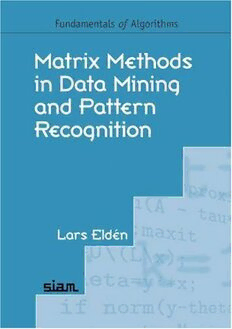Download Matrix Methods in Data Mining and Pattern Recognition PDF Free - Full Version
Download Matrix Methods in Data Mining and Pattern Recognition by Lars Eldén in PDF format completely FREE. No registration required, no payment needed. Get instant access to this valuable resource on PDFdrive.to!
About Matrix Methods in Data Mining and Pattern Recognition
Several very powerful numerical linear algebra techniques are available for solving problems in data mining and pattern recognition. This application-oriented book describes how modern matrix methods can be used to solve these problems, gives an introduction to matrix theory and decompositions, and provides students with a set of tools that can be modified for a particular application. Matrix Methods in Data Mining and Pattern Recognition is divided into three parts. Part I gives a short introduction to a few application areas before presenting linear algebra concepts and matrix decompositions that students can use in problem-solving environments such as MATLAB?®. Some mathematical proofs that emphasize the existence and properties of the matrix decompositions are included. In Part II, linear algebra techniques are applied to data mining problems. Part III is a brief introduction to eigenvalue and singular value algorithms. The applications discussed by the author are: classification of handwritten digits, text mining, text summarization, pagerank computations related to the Google?” search engine, and face recognition. Exercises and computer assignments are available on a Web page that supplements the book. Audience The book is intended for undergraduate students who have previously taken an introductory scientific computing/numerical analysis course. Graduate students in various data mining and pattern recognition areas who need an introduction to linear algebra techniques will also find the book useful. Contents Preface; Part I: Linear Algebra Concepts and Matrix Decompositions. Chapter 1: Vectors and Matrices in Data Mining and Pattern Recognition; Chapter 2: Vectors and Matrices; Chapter 3: Linear Systems and Least Squares; Chapter 4: Orthogonality; Chapter 5: QR Decomposition; Chapter 6: Singular Value Decomposition; Chapter 7: Reduced-Rank Least Squares Models; Chapter 8: Tensor Decomposition; Chapter 9: Clustering and Nonnegative Matrix Factorization; P
Detailed Information
| Author: | Lars Eldén |
|---|---|
| Publication Year: | 2007 |
| ISBN: | 898716268 |
| Pages: | 234 |
| Language: | English |
| File Size: | 2.268 |
| Format: | |
| Price: | FREE |
Safe & Secure Download - No registration required
Why Choose PDFdrive for Your Free Matrix Methods in Data Mining and Pattern Recognition Download?
- 100% Free: No hidden fees or subscriptions required for one book every day.
- No Registration: Immediate access is available without creating accounts for one book every day.
- Safe and Secure: Clean downloads without malware or viruses
- Multiple Formats: PDF, MOBI, Mpub,... optimized for all devices
- Educational Resource: Supporting knowledge sharing and learning
Frequently Asked Questions
Is it really free to download Matrix Methods in Data Mining and Pattern Recognition PDF?
Yes, on https://PDFdrive.to you can download Matrix Methods in Data Mining and Pattern Recognition by Lars Eldén completely free. We don't require any payment, subscription, or registration to access this PDF file. For 3 books every day.
How can I read Matrix Methods in Data Mining and Pattern Recognition on my mobile device?
After downloading Matrix Methods in Data Mining and Pattern Recognition PDF, you can open it with any PDF reader app on your phone or tablet. We recommend using Adobe Acrobat Reader, Apple Books, or Google Play Books for the best reading experience.
Is this the full version of Matrix Methods in Data Mining and Pattern Recognition?
Yes, this is the complete PDF version of Matrix Methods in Data Mining and Pattern Recognition by Lars Eldén. You will be able to read the entire content as in the printed version without missing any pages.
Is it legal to download Matrix Methods in Data Mining and Pattern Recognition PDF for free?
https://PDFdrive.to provides links to free educational resources available online. We do not store any files on our servers. Please be aware of copyright laws in your country before downloading.
The materials shared are intended for research, educational, and personal use in accordance with fair use principles.

